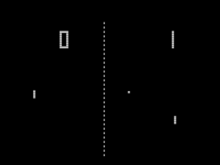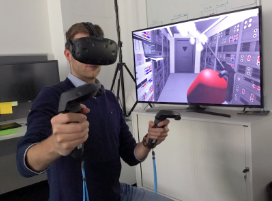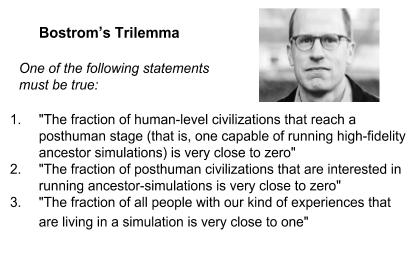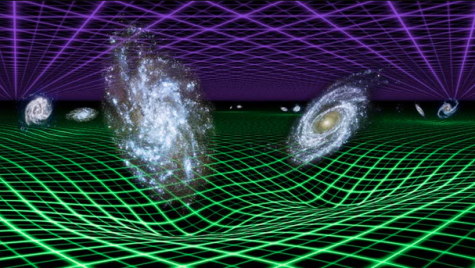Are You Living In A Computer Simulation?
A definitive answer to this question, first posed by Nick Bostrom in 2003, will likely never materialize

In 1972, the game company Atari released their first video game. It was called Pong, and it involved moving a paddle up and down in an attempt to have the paddle make contact with a moving circle.
 Less than 30 years later, Electronic Arts would publish The Sims, a video game that allowed you to control the day to day lives of sims, from their career choices to their interactions with friends.
Less than 30 years later, Electronic Arts would publish The Sims, a video game that allowed you to control the day to day lives of sims, from their career choices to their interactions with friends.
 About another decade later, Virtual Reality would be developed, allowing users to experience an immersive, computer-generated environment.
About another decade later, Virtual Reality would be developed, allowing users to experience an immersive, computer-generated environment.
The drastic differences between these three games illustrates just how rapidly technology is advancing, and one can only imagine the advanced computing power that our future generations will have access to.
It was with this idea in mind that Nick Bostrom, a Swedish philosopher, proposed the idea that we may be living in a computer simulation, all the way back in 2003 (well before Virtual Reality). As Bostrom explains, “One thing that later generations might do with their super-powerful computers is run detailed simulations of their [ancestors] … [Supposing] that these simulated people are conscious, then it could be the case that the vast majority of minds like ours do not belong to the original race but rather to people simulated by the advanced descendants of an original race.”

In short, Bostrom believes that if these technological advancements are possible, there would be several simulated realities, but only one actual reality, which means that as a result it is statistically more likely that that we are living in one of these simulated realities.
While Bostrom’s theory relies on a lot of hypotheticals, the theory has been supported by other well-respected minds. Neil DeGrasse Tyson, an american astrophysicist, has stated that “it is easy for [him] to imagine that everything in our lives is just a creation of some other entity for their entertainment”.
Elon Musk, CEO of Tesla, has also famously stated that there is a “one in billions” chance we are not living in a computer simulation, emphasizing that “if you assume any rate of improvement [in technological advancements] at all, then the games will become indistinguishable from reality, just indistinguishable”. Musk also believes that if this prediction is incorrect, it means that something significant will have to happen to prevent civilization from continuing to advance to that stage.

However, some people have expressed opposite perspectives to this topic. Ned Block, an American philosopher, believes that it is unlikely that a simulation could reproduce consciousness, something that relies on chemical interactions and neurons within the brain. “Just as a simulation of a rainstorm isn’t wet, there’s no reason that a simulation of conscious experience would be conscious experience…we have no reason to believe that even quantum computing would reproduce [original consciousness]”.
Furthermore, some Physicists believe that it is impossible for a computer, no matter how powerful, to actually simulate the universe in its entirety. According to a team of theoretical physicists from Oxford, the complexity of a simulation would increase exponentially based on the number of particles being simulated, meaning that the task of simulating the universe would quickly grow impossible. They also calculated that in order for a computer to properly store information about just a couple hundred of electrons, a computer memory physically requiring more atoms than exist in the universe would be necessary.

However, there is no way of knowing whether or not the laws of our universe would apply to those simulating us. As Zohar Ringel, the lead author of the paper puts it, “Who knows what are the computing capabilities of whatever simulates us?”
Regardless of whether you believe Bostrom’s theory or not, there is no doubt that this topic is as fascinating as it is complex. In fact, Bostrom might have very well posed a question that is impossible to answer.
To answer such a question, one would need to have a complete understanding of the basis of human existence (not to mention Physics and Philosophy) – something that will always be infinitely ambiguous.
Does being simulated make existence, and profound experiences like love, any less meaningful? How does religion or the afterlife play into this theory? What other evidence supports or refutes this theory? Is it possible that our universe is just the premise of some video game for advanced beings? Is deja-vu a computing glitch? Could we be the advanced beings that eventually create simulated universes within our own? Readers are encouraged to continue the discussion in the comments below.









